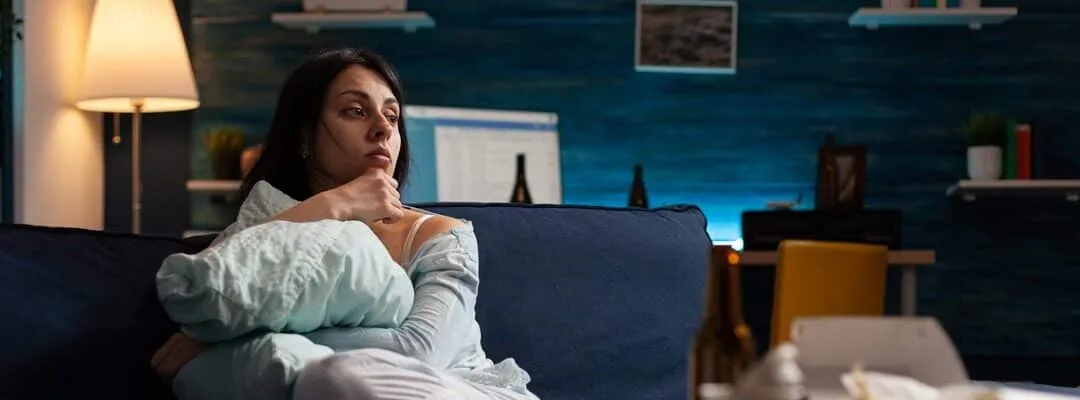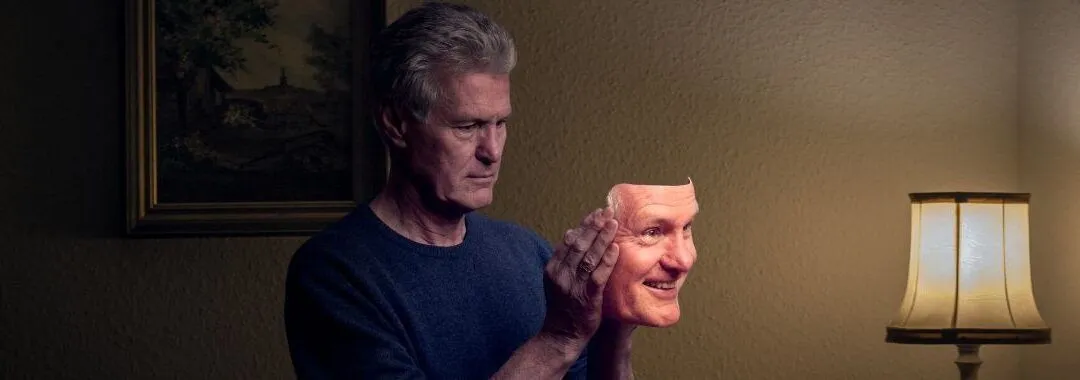Why You Get More Depressed At Night? All About Nighttime Depression

Individuals with depression may experience exacerbations of depressive symptoms at different times during the day. Depressive symptoms including fatigue, restlessness, guilt and loss of pleasure may subside when individuals are busy during the day and may worsen at night. These symptoms may extend past waking hours and even affect sleep. In fact, sleep disturbance is the most common persistent symptom in treated depression [1]. This article will review why depressive symptoms may be exacerbated in the evening, and what classifies “nighttime depression.”
What is Nighttime Depression?
Nighttime depression is not a separately identifiable subtype of depression, rather it represents an exacerbation of symptoms in the evening. As the day winds down many individuals find that they feel more fatigued, sluggish and less likely to engage in enjoyable activities. Others may dread going home from work or school due to loneliness or a volatile home environment.
Some of the factors of nighttime depression may be situational and alleviated by behavioral or environmental changes – including leaving an abusive relationship, or moving out of your family member or friend’s house. However, others may not be due to genetics or seasonal changes.
Why Do You Get More Depressed at Night?
There are various hypotheses regarding why depression is worse at night, which include:
1. Social Isolation/Loneliness
People with depression may keep themselves busy during the day surrounded by coworkers or classmates. However, once they get home, especially – if they live alone or don’t get along with their family or friends [2], they may miss out on social interaction – which can lead to feelings of loneliness at night
2. Circadian Rhythm
Seasonal changes (particularly in the winter) can lead to changes in the amount of daylight each day, which can affect circadian rhythm [3]. Circadian rhythm affects how you may fall asleep and how long you sleep. There is a separate subset of depression called Seasonal Affective Disorder (SAD) which researchers believe is due to a disturbance of circadian rhythm, dysregulation of neurotransmitters as well as some genetic predispositions.
3. Anergia
One of the most common symptoms of depression include anergia [4], or constantly feeling exhausted. Individuals may feel chronically fatigued, and experience difficulties with completing activities which tends to worsen in the evening/after a long day.
4. Feelings of Guilt/Worthlessness
Many depressed patients feel as though they are inadequate, leading to guilt about what they did (or didn’t) accomplish during the day. Once evening arrives, they may tend to ruminate or obsess over their perceived “failures” during the day. It has even been reported that perfectionism carries a high risk of this nighttime overthinking, which then leads to insomnia, as well as anxiety and depression [5].
Does Lack of Sleep Make Depression Worse?
Sleep disturbance is one of the most common concerns of individuals with depression. They may suffer from initial insomnia (falling asleep), middle insomnia (waking up in the middle of the night) and/or terminal insomnia (waking up too early) secondary to their depression. Any (and all) of these types of insomnia can lead to a decrease in hours of sleep which can exacerbate depression. Some individuals with chronic insomnia worry about how long it will take them to fall asleep, how many hours they will sleep and maintain concern about how it may affect their mood/productivity the next day.
This “vicious cycle” can lead to increased stress and worry, and exacerbates insomnia. As such, the stress of not sleeping combined with even more lack of sleep make depression symptoms worse, or harder to cope with.
Can you Do Anything about Nighttime Depression?
There are many non-pharmaceutical options that can help individuals with nighttime depression exacerbations. Not obtaining good, restorative sleep can have negative effects on your mood. Some recommendations for getting better sleep and combating nighttime depression include the following:
1. Maintain a Regular Bedtime
Studies show that having a regular bedtime and wake time can lead to a more regulated sleep schedule and less chance of napping and/or sleep deprivation [6].
2. Avoid Caffeine/Alcohol
Caffeine is a stimulant and should be avoided after lunch (or rather, six hours before bedtime [7]) to prevent insomnia. Although alcohol can be sedating, it can be more activating while metabolized. Research has shown a positive correlation between recurring bedtime alcohol use and insomnia [8], so it should be avoided when late.
3. Exercise
Exercising during daytime hours is strongly recommended for individuals with depression as it can help with improving mood and reducing anxiety. However, exercising too late (less than 1 hour before bedtime) can lead to initial insomnia in some people [9].
4. Mindfulness/Diaphragmatic Breathing
Relaxation techniques such as mindfulness meditation and diaphragmatic breathing can help address present emotions and facilitate relaxation before bedtime [10]. These relaxation techniques can also decrease ruminating thoughts that may inhibit falling asleep and lead to nighttime depression.
5. Avoid Distractions
Leave your electronics outside of the bedroom to help limit bright light exposure around bedtime, as bright blue light emitted by electronics has been shown to reduce or delay the production of melatonin [11] (a hormone your body releases before sleep). Try and keep your activities in bed limited to sleeping and not work to help yourself get into a good routine.
What if Lifestyle Changes Aren’t Working?
Despite utilizing lifestyle modifications (healthy diet, sleep hygiene, exercise) you may still struggle with symptoms of depression during nighttime. Your provider may recommend one (or more) of the following treatments:
- Psychotherapy/CBT – there are various types of psychotherapy with CBT most frequently utilized. Therapy can help to address maladaptive behaviors, reinforcing positive behaviors and can often augment depression treatment when added with medication management. There are even certain subtypes of CBT including CBT-I, for individuals who specifically struggle with insomnia and depression.
- Medication Management – some of the most common medications we use for depression include SSRIs, SNRIs and atypical antidepressants. There are also various antidepressant medications that can help address both depression and insomnia as well. These medications help to increase levels of certain neurotransmitters implicated in depression.
- TMS (Transcranial Magnetic Stimulation) – TMS is a non-invasive, FDA approved treatment for individuals who fail (or have side effects to) traditional antidepressants. TMS helps to stimulate areas of the brain that are lying dormant secondary to depression.

Kristen Schwartz, MPAS, B.S.
Physician Assistant (PA-C)
Medically Reviewed by Walter G. Griffith Jr., MD, PA
Kristen was born and raised in St. Petersburg, FL and received her Bachelor of Science degree from the University of South Florida. She then attended Florida Gulf Coast University where she received her Master of Physician Assistant Studies degree. Kristen has maintained a long-standing interest in psychiatry which was solidified while on rotations in the Fort Myers area. Kristen received her Certificate of Added Qualification in Psychiatry. Kristen provides compassionate, patient-centered care to all her patients. In her free time, she enjoys traveling, spending time with family as well as her 2 cats, Ernie and Apricot.
Request an Appointment
Our care team would love to hear from you! We want to see our patients get healthy.
This is our top priority.
- 727-577-1203
- Free Consult







